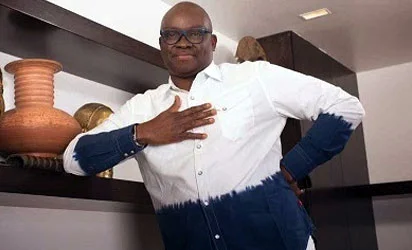A Federal High Court in Lagos has given former Ekiti State Governor Ayodele Fayose a big win by dropping all money laundering and fraud charges against him, totaling ₦6.9 billion.
Justice Chukwujekwu Aneke made this call after accepting Fayose’s no-case argument, which challenged the case pushed by the Economic and Financial Crimes Commission (EFCC).
The judge felt the EFCC didn’t show enough proof to link Fayose to the crimes or build a case strong enough to make him defend himself.
This ruling wraps up a long and tiring legal fight, letting Fayose start fresh after years of being watched closely by the public.
The Story Behind the Court Case
This decision came after a break on May 20, 2025, when top lawyers presented their points in court.
Chief Kanu Agabi, SAN, fought for Fayose, while Olalekan Ojo, SAN, spoke for Spotless Investment Limited, the other party involved.
Rotimi Jacobs, SAN, led the EFCC’s team.
Fayose’s legal troubles began in 2018 under Justice Mojisola Olatoregun, but the case shifted to Justice Aneke later at the EFCC’s request.
The claims said Fayose took ₦1.2 billion for his 2014 campaign and $5 million in cash from a past official, avoiding banks.
They also accused him of spending over ₦1.6 billion on properties through companies like De Privateer Ltd and Still Earth Ltd, which might have broken the Money Laundering (Prohibition) Act, 2011.
The 11 charges, brought up again before Justice Aneke, connected these actions to his governor days and funds tied to a former National Security Adviser.
How the Defense Won the Day
Chief Agabi used a no-case filing from July 16, 2024, to show the EFCC’s case was shaky.
He mentioned that Abiodun Agbele, who was said to be involved, wasn’t tried with Fayose, which weakened the story against him.
“The reasons for these charges just don’t add up,” Agabi explained, pointing out that crimes like breaking trust and plotting are different, and no one else was charged as a partner.
He asked the court to rule that Fayose didn’t need to explain himself, and Justice Aneke agreed.
This clever move exposed weak spots in the evidence, leading to Fayose’s freedom and starting conversations about how the EFCC does its work.




















